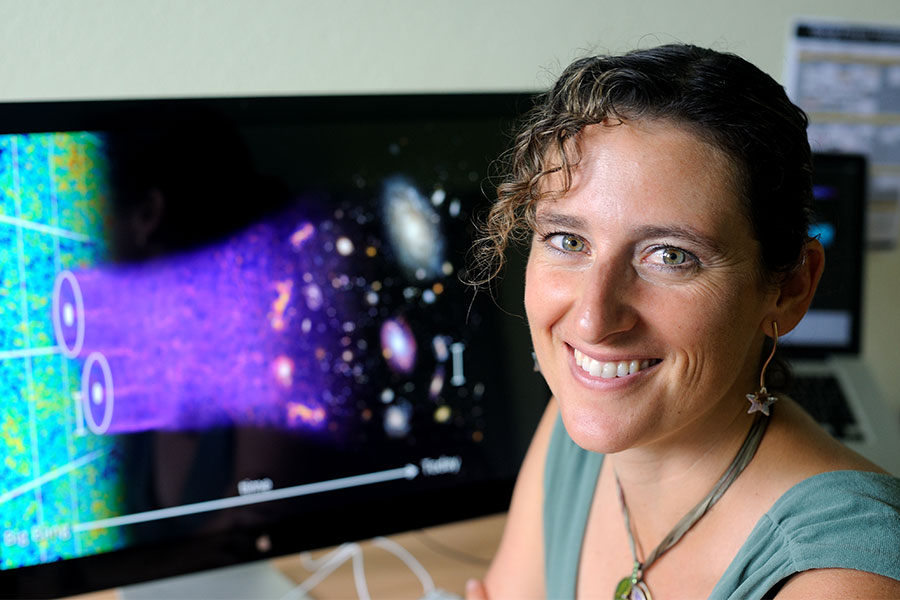Queen’s Birthday Honours: Professor Tamara Davis
Contact magazine is celebrating the outstanding UQ scientists recognised during this year's Queen's Birthday honours. In this story, we feature star astrophysicist Professor Tamara Davis, from the School of Mathematics and Physics.
Professor Tamara Davis’s research credentials speak for themselves. She was awarded Professor status at a very young age, has led multiple international collaborations in astrophysics and has worked with no less than three Nobel Laureates.
Her recent award as a Member of the Order of Australia (AM), however, recognises something that’s arguably just as important – her ability to reach people and turn budding young scientists, as well as the general public, onto astrophysics.
Yet, despite her stellar track record, Professor Davis said she was shocked to receive the Queen's Birthday honour.
“I don’t know who nominated me, so the first time I heard of it was the email I received when I was offered it,” she said.
“It’s quite amazing to be counted in that company. It hadn’t been even on my horizon that I might be considered for such a thing.”
The award recognises her “significant service to astrophysical science”.

One key aspect of this has been her ability to use theoretical science to provide explanations for fascinating phenomena that observational astrophysicists document with their telescopes and instruments.
Her first experiences in doing so came when she was recruited as a postdoctoral researcher by Professors Brian Schmidt and Saul Perlmutter, both of whom would later go on to win the Nobel Prize for the discovery of dark energy.
“When I went to work with them, the discovery that they would eventually win the Nobel Prize for had just been made,” Professor Davis said.
“I was in on the ground-floor, working with them to confirm it and looking at the theoretical possibilities that could explain what they discovered. That was a fantastic introduction into linking the theory and observations, which is what I ended up carrying on for much of my career.”
After a couple of years working as a postdoctoral researcher at the University of Copenhagen, where she remains an affiliate professor, Professor Davis returned to Australia to begin the WiggleZ Project at UQ, looking at a new way to measure the expansion of the universe.
“Since then, I helped manage the Australian Centre of Excellence for All-Sky Astrophysics (CAASTRO), and I am now helping to lead the Australian involvement in two big international projects – the Dark Energy Survey (DES) and the Dark Energy Spectroscopic Instrument (DESI). These are phenomenally powerful surveys measuring hundreds of millions of galaxies, and the science they enable is really exciting.”
Contributions to science aside, an important additional consideration in Professor Davis’ AM nomination was her extensive outreach work, including presenting several documentaries and television appearances, such as on ABC’s Catalyst.
Professor Davis’s success in outreach largely comes from her understanding of how to communicate science.
“You have to really tailor your talks to the audience, and know what they’re interested in hearing,” she said.
“It’s difficult for a lot of people. Sometimes they want to tell the audience something that is interesting to them, but might not be the right perspective for the people in the audience.
“I try to help people feel the excitement of the things we do on a daily basis. Explaining that it’s not just looking up and observing pretty things in the sky, but that modern telescopes can tell us so much more than that.”
Professor Davis has also been recognised for her mentorship and nurturing of young scientists.
She recalls a memorable example.
“I was invited to give a public talk at an ABC event in Bundaberg during my PhD. At the end of the event, a Year 10 student in the audience came up to me and was eagerly asking questions. Fast-forward some years when I was teaching at UQ, a PhD student came up to me saying that he was the student asking all the questions at the event, and that the talk inspired him to pursue his scientific direction.
“Stories like that are the kind of things I really enjoy.”
Despite her success, Professor Davis remains humble, and said she felt lucky because there were “so many people out there doing amazing things”.
“It feels like a fluke that I would be singled out among them. I have to give a shout out to all the hidden heroes out there doing just as much as me or more, but with less recognition,” she said.
“The award is an amazing honour and I hope I do it justice.”
Professor Davis joins fellow UQ researchers Professor Perry Bartlett, from the Queensland Brain Institute; Professor Kaye Basford, from the School of Biomedical Sciences; Professor Ranjeny Thomas, from the Diamantina Institute; and Professor Jeffrey Lipman, from the Faculty of Medicine, in receiving Queen’s Birthday honours.



